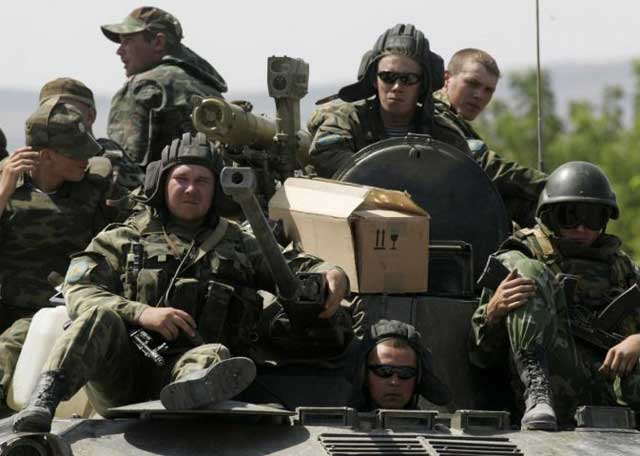Inside the city overrun by Russian army

The Russian occupation of large areas of Georgia continued yesterday in apparent defiance of international agreements and promises to withdraw.
Gori, the largest city in Georgia held by the Russians, was blocked off from the international media by Russian soldiers in armoured cars who said they had no idea when they would be pulling out. The Independent, which reached the city yesterday by using back roads, found a population angry towards both the Russians and the Georgian government.
Long queues have formed outside the sole distribution centre for food aid in the city, with residents complaining that they are not being given nearly enough.
Unlike the main road from the capital Tbilisi to Gori, which had numerous Georgian and Russian checkpoints, the back route was relatively clear, with The Independent being waved through by two soldiers after a cursory glance at our papers.
There was little evidence of widespread looting inside the city, as had been claimed by the Georgian government. However, some locals accused individual Russian soldiers of acts of brutality.
Arkady Chumbanadze, 70, said his 26-year-old son had been shot dead by Russian soldiers. He said: "It happened two days ago. He was trying to cross the bridge when a Russian soldier at a checkpoint opened fire for no reason. He was shot twice in the chest and once in the head. We buried him the same day. My father died fighting for the Red Army in the Second World War and I served as a Soviet guard on the Turkish border. I had never harmed Russia, why did they murder my son?"
The Georgian flag flew at half mast at the city hall, where a statue of Stalin looked down on the main square which had been the mustering point for Georgian troops before they attacked Tskhinvali, the capital of the breakaway province of South Ossetia. The assault triggered a war which saw Russian jets bomb Georgian cities.
Gori is Stalin's birthplace and Russian soldiers gathered outside a museum dedicated to the former Soviet leader. It had been damaged and shut, but the soldiers took pictures of each other at the front of the building with their mobile telephones.
Around 80 per cent of the population of Gori had fled after the city came under Russian land and air attack. Some have drifted back but there is little by way of food supplies in the city.
Lea Lazarishvili had just collected rations for her family, which consisted of three packets of pasta shells and some loose lentils. She said: "We have come here from our village five kilometres away which had been destroyed. Look at this, can one live like this in the 21st century? "Thank God the Russians did not let the Ossetians in. But where is the Georgian army and the Georgian government, we have Russians driving around in tanks in our city."
Marina Aleshina, a Russian woman who is married to a Georgian said: "The Russian troops have been very kind. They give chocolates to the children and cigarettes to the men. We are now afraid of what will happen if they leave, we think that the Ossetian militia will simply come in and there will be trouble. We do not believe that the trouble is over, it is frightening at night and we can hear gunfire in surrounding areas. We need international forces here as soon as possible."
Georgian forces, who were supposed to be taking over Gori and other occupied areas, were positioned 25 miles away, between the city and Tbilisi. The Georgian Foreign Ministry said it had seen no signs of a Russian withdrawal and, if anything, they were broadening their presence.
Meanwhile, Russian troops continued to be positioned at Igueti, less than 20 miles from Georgia's capital.
US officials in Washington, on condition of anonymity, said the Russians had deployed short range missile launchers capable of striking at Tbilisi.
Join our commenting forum
Join thought-provoking conversations, follow other Independent readers and see their replies
Comments